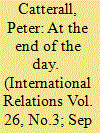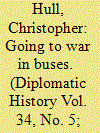| Srl | Item |
| 1 |
ID:
117427


|
|
|
|
|
| Publication |
2012.
|
| Summary/Abstract |
Pre-publicity for the final volume of Harold Macmillan's memoirs, At the End of the Day, stressed that it would provide the British side of the Cuban missile crisis for the first time. The Churchillian model chosen, changes required by the Cabinet Office and Macmillan's desire to rebuke those political opponents who claimed that the crisis demonstrated a lack of British influence in Washington, however ensured a focus on his personal relationship with President Kennedy. His larding the text with contemporary observations from his diaries also skewed Macmillan's account and, in particular, underplayed the significance of British moves at the United Nations in New York to secure a credible United Nations inspection regime and a US guarantee of the inviolability of Cuba. Careful reconstruction of Macmillan's real-time experience of the Cuban missile crisis demonstrates the limitations of his own account of this event.
|
|
|
|
|
|
|
|
|
|
|
|
|
|
|
|
| 2 |
ID:
099986


|
|
|
|
|
| Publication |
2010.
|
| Summary/Abstract |
The sale of buses by the Leyland Motor Company to Cuba proved contentious, not only in the realm of Anglo-American relations, but also in the domestic sphere of a behind the scenes inter-departmental disagreement within the British government. This is because the bus exports pitted political against economic interests at the height of the Cold War and in the midst of a British export drive. As Her Majesty's Government readily recognized, Washington was particularly sensitive over any issue related to Cuba, which by 1963 was firmly in the communist orbit of the Soviet bloc and which the United States was determined to isolate economically through the application of a trade blockade.
The decision to approve the sales came at the end of the Macmillan and Kennedy administrations, and clouded the short-lived partnership of Prime Minister Alec Douglas-Home and President Lyndon B. Johnson. The bus exports became an election issue in the campaigns of both leaders in 1964, assuming a political significance that belied the buses' seemingly innocuous function and outward appearance.
|
|
|
|
|
|
|
|
|
|
|
|
|
|
|
|
| 3 |
ID:
174174


|
|
|
|
|
| Summary/Abstract |
This article revises the narrative of the pre-independence troubles in Cyprus to take greater account of Anglo-Turkish interactions. Initial Turkish reluctance to play any role was overcome by the determination of Harold Macmillan as British Foreign Secretary after April 1955 to bring the country into the centre of the picture. The analysis underlines how, far from simplifying any solution, this intensified Turkish suspicions of the motivations behind British policy. These doubts came to pivot on the option of partition in any exercise of Cypriot self-determination. The end-game of Cypriot independence was characterized not by ‘Anglo-Turkish alliance’, but by a fragile Greco-Turkish understanding.
|
|
|
|
|
|
|
|
|
|
|
|
|
|
|
|